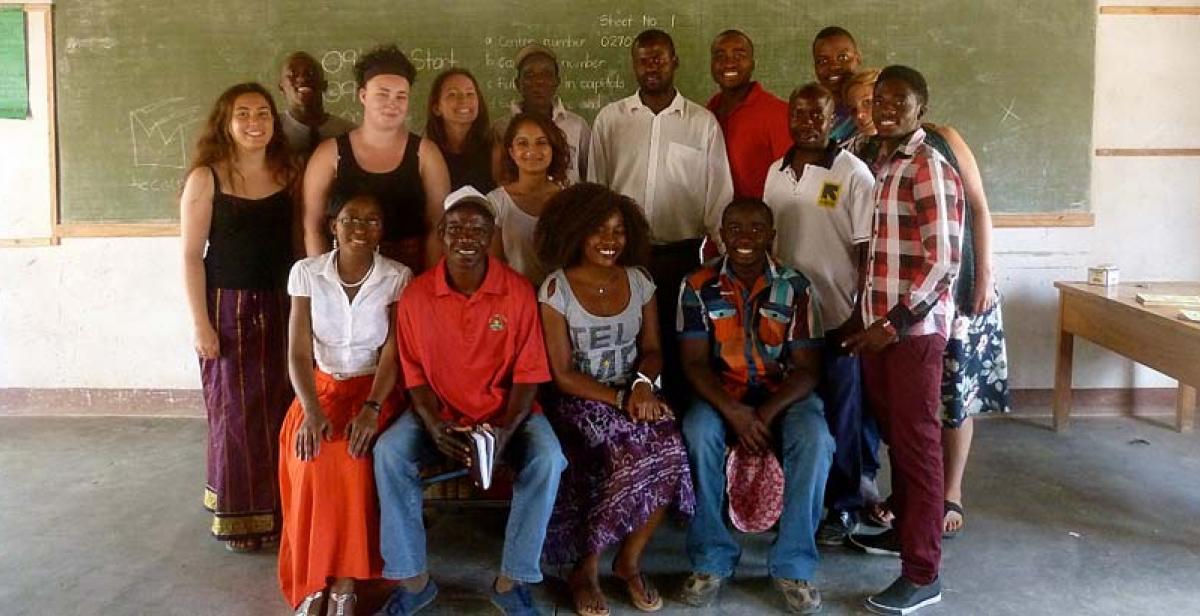Day one in Zimbabwe saw the UK volunteers stepping out blinking into the bright October sunlight. We spent a night in Harare at the Women’s Bureau, where the streets were carpeted with purple jacaranda flowers and we enjoyed our first authentic Zimbabwean power cut. The next day we drove to Mutare, enjoying breathtaking views down from the hills over the city and equally delightful signposts counting down the distance to our nearest Nando’s.
In Mutare, all the ICS volunteers went to St Joseph’s Diocesan Training Centre. The UK volunteers joined the national volunteers for a week of training and orientation, formal education and informal introductions to Zimbabwean culture. For the UK volunteers, the power and water arrangements at St Joseph’s were a practical introduction to load-shedding (the cause of our daily power outages) and cold bucket showers, while our daily activities were fuelled by mountains of the Zimbabwean stable sadza (maize porridge). For our national counterparts, an introduction to British sarcasm was surely the highlight of the programme.
In sessions ranging from communication to workshop facilitation, monitoring and evaluation to cross-cultural differences, we learned how to assess a community’s needs, monitor project impacts and bridge the gap between our different worldviews, backgrounds and experience. For the Simukai rural group, we had our first opportunity to learn in detail about Rowa, the rural area outside Mutare to which we would be travelling. Operating under the auspices of ZOE (Zimbabwe Orphan Empowerment service) we began to design workshops, awareness days and home visit plans which would allow us to reach out to vulnerable young people, whilst being careful never to contact stakeholders except those for which ZOE had given permission.
Cross-cultural learning was, fittingly, not restricted to our formal orientation. Outside class, we bonded by sharing bedrooms, dance-offs, and the universal frustration of a weak wi-fi connection. In class, the UK volunteers gawped at the discovery that looking an elder in the eye while they are telling you off could be seen as insolent, not respectful, and national volunteers were bemused by the news that British people express their affection with rich descriptions of how much they hate each other. A mood of pleasant confusion dominated the cross-cultural workshop, after the UK volunteers informed the group that British jokes take approximately two weeks to diagnose.
As our orientation week drew to a close, the UK volunteers departed to meet their homestay parents and the national volunteers returned home for the weekend. The discovery that Sunday really means a church visit, that shops mostly close and life in Mutare turns towards the home was an interesting contrast for many of the UK volunteers. Visual Media Officer Ellie celebrated her nineteenth birthday (where else but Nando’s?) and then our week of project planning began.
Although our project would eventually take us out into comparatively remote rural areas, the rural team spent week two at the Simukai Child Prevention Centre, in a green and sunny corner of Mutare’s Yeovil district. We enjoyed luxuries like fleeting wi-fi connectivity and a resident hen and baby chicks (not, sadly, laid on for our entertainment but for more practical purposes). With only limited understanding of where we were going, who we would meet and what skill and knowledge areas we would target, our planning centred around a series of hypotheticals. “If this…then that” became our planning motto, but until we visited Rowa itself, those plans couldn’t become reality.
Arriving by Kombi into Rowa, the bumpy drive brought nausea to some volunteers and joy to the local children, who greeted us like celebrities. We met four of the six incredible mentors who volunteer their time to work with ZOE’s beneficiaries.
We were delighted to hear that many of the income-generating activities from last cycle have tangibly improved the childrens’ lives. Some children are rearing poultry, running tuck shops and even – at the more innovative end of the scale – setting up a much-needed grain mill in the local community. One group raised over $1000 and another had managed to buy goats – a valuable commodity in Rowa - with their profits. In the weeks ahead, one of the Rowa group’s tasks will be to bring real, positive impacts like this one to vulnerable young people and their families.
Written by ICS Team Simukai Rowa



